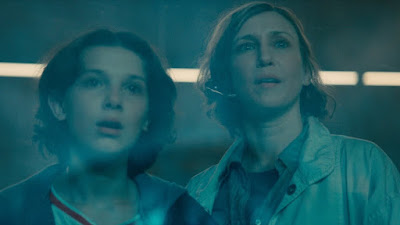Their only hope lies with the mountain-sized juggernaut Godzilla.
 |
| Of course the Japanese poster is cooler |
It has no real pretensions toward being something more. The original 2014 movie spent its runtime on the human characters in an attempt ala Jaws to create a relatable vantage point to the rise of a creature like Godzilla, with the big lizard only glimpsed in snippets until the end.
Gareth Edwards’ movie is a valiant but flawed attempt to restore some of Godzilla’s menace and sheer scale. The downfall of that movie is that the human spine was not as strong as it needed to be. Michael Doherty makes no attempts to hold off on the monsters - they come early and they come often.
This movie feels like a reaction to its predecessor in this respect, although Doherty’s handling of the monsters is shaky. With any genre movie it is important to establish rules. A key one is to establish a sense of stakes: for example, when a creature the size of a mountain lands beside you, or when a vehicle explodes close by, what effect does that have on the human body?
There is so much destruction, but rarely does it feel like the human characters are reacting enough to what is going on. I could go on about the importance of geography and the weightlessness of too much CGI, but you get the idea.
The key failing with this movie is the same as its predecessor - the human story is never fleshed out enough to engage. Kyle Chandler and Vera Farmiga play a divorced couple who lost a child during Godzilla's last rampage. In the time since, he has become a recluse, and she has become a full-on super-villain intent on resurrecting Godzilla's fellow monsters to reclaim the Earth from the excesses of human beings.
There is a nugget of an idea here - the monsters' destruction is actually providing an opportunity for nature to reclaim areas destroyed by urbanisation - but we spend so little time with Chandler and Farmiga at the outset that the tragedy that pulled them apart never really connects to Farmiga's fanatical desire to un-terraform the earth.
She just comes across as a dangerous idealist who is completely disinterested in the millions of lives she is allowing to die. There might be a bit of commentary here: the area that we see the most of is a poor village in Mexico - are the filmmakers satirising rich white people's ideas for saving the environment and how these plans ignore minorities, the poor and anyone else without their money and privilege?
Probably not. For some reason the movie insists on making Farming a sympathetic character. Even though she sacrifices herself for the greater good at the end, it is not enough of a re-balance to address the genocidal levels of human misery she has left in her wake.
On a certain level I could appreciate a monster movie that attempted to create morally blurred protagonists (I guess this is meant to echo Chandler's mixed feelings toward the title creature, who was responsible for the death of his son), but Godzilla II - Smash Harder spends so little time on these relationships that the Chandler-Farmiga subplot comes off as flippant and cliche. Having Chandler as a logical everyMAN and Farmiga as a scientist complicated by her silly emotions (women!) smacks of old-school sexism.
The rest of the acting is fine, but they are all stuck playing familiar monster movie cliches - stern military person (Aisha Hinds); jokey scientist (Bradley Whitford); serious scientist (Zhang Ziyi); sage who sacrifices himself (you can guess who). They are just your usual band of bystanders and hype men for the fights.
The rest of the acting is fine, but they are all stuck playing familiar monster movie cliches - stern military person (Aisha Hinds); jokey scientist (Bradley Whitford); serious scientist (Zhang Ziyi); sage who sacrifices himself (you can guess who). They are just your usual band of bystanders and hype men for the fights.
I was not a fan of the last Godzilla, but one of the things I really dug was the slow-burn reveal of the big blue galoot - Gareth Edwards always framed the creature from a human point of view which added a sense of human scale and wonder to the movie.
There's nothing like that here. While it will satisfy some people just to see all their favourite monsters on the big screen, I felt almost nothing watching their big battles. Doherty is overwhelmed by the scale of destruction, that the stakes fly out the window (into Rodan's mouth).
There's not even much of a dramatic escalation to the battles - you never feel like Godzilla is learning or trying new things. He just gets juiced from a nuke and does exactly what he usually does until Ghidorah dies. Big whoop.
There are occasional things which are fun - the three heads of Ghidorah appear to have different personalities, and bicker over their prey like wolves at a carcass; there's a beaut of a shot of Ghidorah perched atop a volcano that is awesome.
But these things just throw into light how generic the rest of this movie is.
If you want monsters smashing things, this movie might satisfy you. But not enough to justify going to a theatre to see it.
If you are new to this blog, I also co-host a podcast on James Bond called The James Bond Cocktail Hour. Every episode, we do a review of one of the books and one of the movies, picked at random.
In the latest episode we discuss the portrayal of women in the Bond franchise. Subscribe on iTunes, or wherever you get your podcasts!















